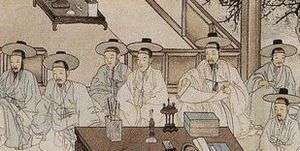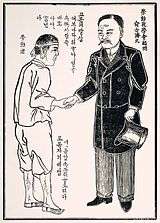Manhwa
 |
| Part of a series on the |
| Culture of Korea |
|---|
| History |
|
Music and performing arts |
|
|
Monuments |
|
National symbols of Korea |
|
| Manhwa | |
| Hangul | 만화 |
|---|---|
| Hanja | 漫畫 |
| Revised Romanization | manhwa |
| McCune–Reischauer | manhwa |

Manhwa (Hangul: 만화, Korean pronunciation: [manhwa]) is the general Korean term for comics and print cartoons (common usage also includes animated cartoons). Outside of Korea, the term usually refers specifically to South Korean comics.[1]
Manhwa has been influenced by the dramatic modern history of Korea, resulting in a diversity of forms and genres, including a mainstream style akin to manga. Distinctive manhwa can be found in editorial comic strips, artistically oriented works, and webtoons.
History of the term
Linguistically, 漫画 (manga), 漫畫 (manhua), and 만화 (漫畫 manhwa), 만필화(漫筆畫, manpilhwa) all mean comics in Japanese, Chinese, and Korean respectively. The term, along with manga, is a cognate of the Chinese manhua. Complications arise because in these languages the terms manga/manhua/manhwa can all mean comics in general. The author of a manhwa is called a manhwaga.
Adaptation of term
The relative obscurity of Korean culture in the Western world has caused the word "manhwa" to remain somewhat unknown in the English-speaking world. Instead, English translations of manhwa have achieved success by targeting the manga and anime community, to the extent that manhwa are often marketed as "manga."
Development of webtoons
After 2003, webtoons, the term used for Korean webcomics, are having notable development as setting the form of its platform distinctive from webcomics of other regions.[2]
Korean manhwa publishers
- Daewon C.I.
- Haksan Culture Company
- Seoul Culture Corporation
- Shinwon Agency Corporation
Manhwa in the United States
Sanho Kim was the first artist manhwa published in the States, during the 60s and 70s, he worked for publishers Charlton Comics, Warren Publishing Iron Horse Publishing, Skywald Publications and Marvel Comics.[3]
According to journalist Paul Gravett, in 1987 Eastern Comics published the first original manhwas in the United States.[4]
Due to the explosion of manga's popularity in the Americas, many of the licensed titles acquired for the American market seek to emulate the popular elements of other successful series.[5] Recently, long-running webcomics serialized via Internet portal sites (e.g., Media Daum) and personal homepages have become both the creative and popular basecamp among the younger generation in Korea.
Direction of text
Manhwa is read in the same direction as English books, horizontally and from left to right, because hangul is normally written and read horizontally, although it can also be written and read vertically from right to left, top to bottom.
North American manhwa imprints
- ADV Manga
- Dark Horse Manhwa
- DramaQueen
- DrMaster Publications
- Media Blasters
- Netcomics
- NBM ComicsLit
- Seven Seas Entertainment
- UDON's Korean Manhwa
- Yen Press
Animation and live-action adaptations
Animation based on Korean comics is still relatively rare (though there were several major hits in the late 1980s and early 90s with titles such as Dooly the Little Dinosaur and Fly! Superboard). However, live-action drama series and movie adaptations of manhwa have occurred more frequently in recent years. Full House in 2004 and Goong ("Palace" or "Princess Hours") in 2006, are prominent examples as both have been counted as the best dramas of their respective years.
In 2007, The Great Catsby, an award-winning Korean webcomic, was adapted into a live-action drama, after a run as an on-stage musical in 2006. The title was also planned to be adapted into a feature film in late 2007.[6]
In 2006, SamBakZa produced There she is!! which is about the developing relationship of a rabbit and a cat.
Priest, a manhwa by Hyung Min-woo that has been translated to English, was adapted into the 2011 American sci-fi action horror film of the same name by Screen Gems. Released in 2011,[7] it was produced by Michael DeLuca, directed by Scott Stewart, and stars Paul Bettany as the title character.[8][9]
War of Money is another dramatized manhwa that has become immensely popular in South Korea, garnering much attention for its soundtrack and actors.
In 2004, Blade of the Phantom Master, a popular manhwa, was adapted into an animated film by a joint Korean-Japanese animation team.
In 2013, a film based on a manhwa webcomic - Secretly, Greatly - became a top-grossing film.[10][11][12]
See also
- List of manhwa
- Sunjung manhwa
- Myeongnang manhwa
- Manhwabang
- Culture of South Korea
- Korean Wave
- Korean animation
- Webtoon
- Video gaming in South Korea
References
- ↑ Glossary of Manga-Related Terms
- ↑ "Webtoon, Why So Popular?". Retrieved 2014-09-15.
- ↑ Kim entry, Lambiek's Comiclopedia. Accessed June 9, 2011.
- ↑ Paul Gravett. Make Mine Manhwa!: Exporting Korean Comics
- ↑ Arnold, Andrew D. (2006-01-25). "Life and Literature Without Robots". Time. Retrieved 2010-05-12.
- ↑ "The Great Catsby: Hit Korean Internet Comic Drama-tized into TV form debuts in 4 days". Retrieved 2007-07-01.
- ↑ Paul Bettany to Join Screen Gems' Priest?
- ↑ Olsen, Kevin Noel (January 25, 2007). "Amityville Director Set to Direct Priest Film Based on Tokypop Graphic Novel". Silver Bullet Comics.
- ↑ Fischer, Martha (June 26, 2006). "Butler to Priest". Cinematical.com.
- ↑ http://ph.omg.yahoo.com/news/secretly-greatly-becomes-top-grossing-manhwa-to-film-101400409.html
- ↑ http://twitchfilm.com/2013/06/korean-box-office-not-so-secret-secretly-greatly-break-records.html?utm_source=feedburner&utm_medium=feed&utm_campaign=Feed%3A+TwitchEverything+%28Twitch%29
- ↑ http://english.chosun.com/site/data/html_dir/2013/06/10/2013061001331.html
- Son Sang-ik (1999). 한국만화통사 1 (General History of Manwha 1) (in Korean). Sigongsa. ISBN 89-7259-890-9.
- Hart, Christopher (2004). Manhwa mania : how to draw Korean comics. New York: Watson-Guptill Publications. ISBN 0-8230-2976-X.
- Kim Jinsu (2007-06-02). "개화기 일제의 시사만화 탄압 (The Japanese oppression on Sisa manhwa)" (in Korean). Chammalo.
- 만화 (in Korean). Empas/ Encyclopædia Britannica.
- "Manhwa" (in Korean). Empas/ EncyKorea.
- Sim Ji-hoon. "Korea Manhwa Museum". INISteel Webzine (in Korean).
- Sugiyama, Rika (2004). Comic artists — Asia : manga, manhwa, manhua. New York: Harper Design International. ISBN 0-06-058924-8.
External links
Manhwa information
- "Korean Comics in the U.S., Part 1, Comic-Con International 2004," Jade Magazine.com, Sep. 2004
- "Korean Comics in the U.S., Part 2, Manhwa Sampler," Jade Magazine.com, Sep. 2004
- "Sang-Sun Park, Les Bijoux Comic Artist," Sequential Tart.com, Aug. 2004
- Manhwa site for "Demon Diary" (마왕일기)
- "Infinity Studios and Manhwa," Anime Tourist.com, 16 June 2004
- Our Toys, Our Selves: Robot Taekwon V and South Korean Identity
- Cain, Geoffrey. "Will the Internet Kill the Manhwa Star?" The Far Eastern Economic Review, November 6, 2009
Popular manhwa artists
Festivals
- Bucheon Manhwa Information Center
- Bucheon International Manhwa festival
- Seoul International Comics and Animation Festival
- Dong-a/LG International festival of comics and animation
Manhwa on mobiles
Associations
- Cartoon & Animation Society in Korea
- Seoul Cartoon
- The Korean Cartoonist Association
- Korean Women Cartoonist Association
- Amateur Comics Association
- Korea Amateur Comic Land
Information and studies
- Korean Society of Cartoon & Animation Studies
- Seoul Animation Center
- Puchon Cartoon Information Center
- The Korea Society Manhwa Exhibit
